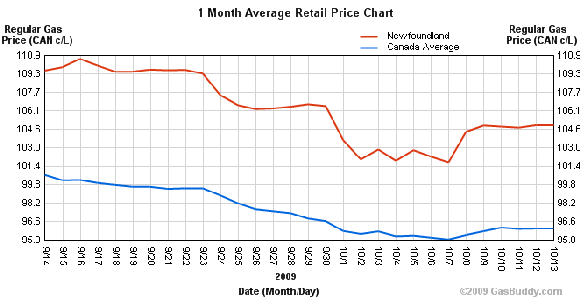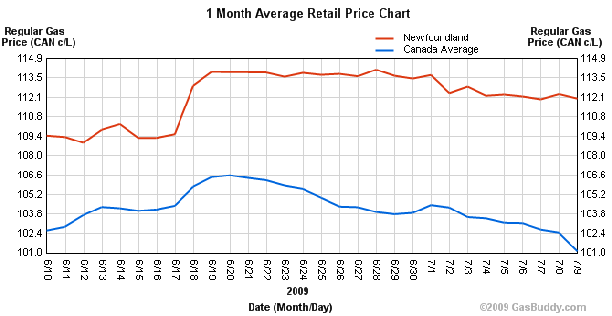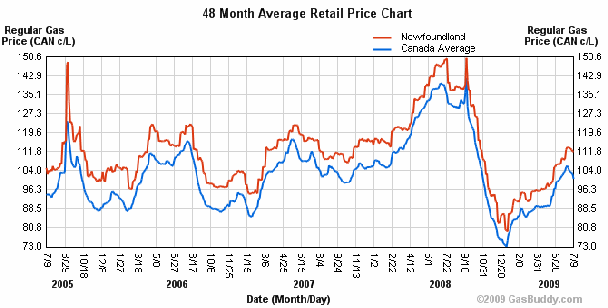The 2003 general election did not herald a new approach, a new era in public policy or much "new" of any other sort except elites.
That's a point your humble e-scribbler has made several times and it bears repeating. In many respects, the Progressive Conservatives under Danny Williams have continued policies from Roger Grime's Liberals often times without any changes at all, let alone even cosmetic ones.
One of the most obvious examples of the continuation of Grimes policy is the consumer rip-off otherwise known as petroleum products pricing.
Regular readers will be familiar with the view around these parts of the provincially-run price-fixing scheme that masquerades as some sort of consumer protection.
It doesn't protect consumers from anything at all, since by interfering in the marketplace, the price fixing scheme serves only to slow the benefit to consumers of falling gasoline prices.
Like right now.
On Tuesday, crude oil hit US$112, its lowest close in three months.
Consumers are not paying the same price per litre for gasoline that they were three months ago.
In fact, oil dropped dramatically just last week, but the petroleum office did not lower prices a
single penny. gasoline sits, on average about 12 cents per litre higher in Newfoundland than across Ontario, but if you look at the localised breakdowns the price gap is disgustingly wide. In glorious Kingston, Ontario, where your humble e-scribbler is currently enjoying the rain, gasoline is retailing for
$1.17 per litre.
The situation is not far off what obtained
three years ago but even then it was fairly obvious that the marketplace was delivering price breaks to consumers that the government-orchestrated scam could not. heck, at a time when prices were dropping across North America only a few weeks ago, Newfoundlanders and Labradorians enjoyed a price
increase, courtesy of the government folly.
Now when this whole fraud was foisted on the public, the politicians could be forgiven if they were simply suckered into it as a vote ploy. Some of them might have even been fooled into believing the silly arguments used to justify it that somehow consumers would be protected from the "evil" oil companies if the provincial government established maximum prices for (some) petroleum products,
There isn't really the same excuse any more and there certainly hasn't been since 2003. After only a couple of years of operation, the folly of government-organized oil price fixing was evident, at least to consumers.
The argument for government price-fixing is even harder to swallow now that the provincial government has joined the ranks of the oil companies.
Consider if you will, that simple point when (if?) the Hebron deal gets signed. Sitting at the table will be major oil companies who produce crude oil and who retail gasoline across North America. The petroleum pricing scheme was supposed to protect consumers from their supposed "gouging".
Sitting right next to them will be a new oil producer who, at least in this province, not only produces crude oil but who also legally fixes the retail price for gasoline products. We just don't know where the government share of the crude will be refined and sold, but what's to stop it from coming back to this province or - if the provincial government gets involved further with NLRC - never leaves it?
It's a sweet set up.
But not for consumers.
-srbp-



